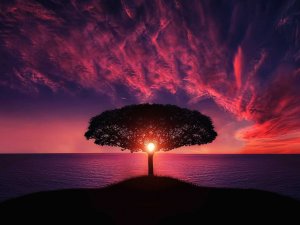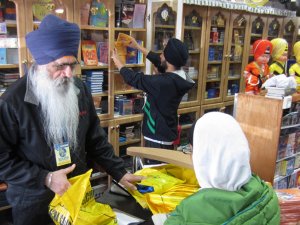For years I played with a pencil or a pen. Now life has changed and I play with the mysterious hidden power of a computer. The story I pick up today, I assure you, is the absolute truth. Yet it seems to be the most imaginative product of a harebrain: I suppose I may fit that.
Some details are simple. I came to this country on a fellowship to study. There were perhaps 3 Sikhs where I lived and worked for years, and no Gurduara in the state. Times changed, and Sikhs are now a dime a dozen and perhaps more than a dozen Gurduaras are within driving distance of where I live and work. The different ways of different people fascinated me. This story develops over roughly 20 years.
I always felt free to visit – cavort around – other places of worship irrespective of religious identity. It was a joy to transcend differences. The timeless adage empowered me with its call: “Know thyself and know thy neighbor.”
My story today runs about a full decade and is largely the trek of one lady, a New Yorker whose religious affiliation I will not reveal. She became curious about Sikhs -- her different looking neighbors. In time, slowly she became curious about Sikhi and became a regular at the Gurduara. Her curiosity awakened. She even studied Punjabi language at the Gurduara Sunday school, even though her command of conversational Punjabi remained somewhat troublesome but charming.
And then in a trice she became Amritdhari. Just imagine that. She even changed her name for a landmark Sikh name. Time passed. Days became weeks, months, and years. In a memorable day and in a monumental way, she had become an integral part of the Sikh community.
But habits of a lifetime are not so easily shelfed, discarded and replaced or reframed, especially if the language to be newly adopted is entirely different.
Years passed though not always kindly. She married a fellow religionist but that union collapsed. Yet our personal friendship continued to flower. I suppose I could lay a significant burden on the silent but prominent “No Approval” from the wider non-Sikh community, as well as a leery suspicious non-welcoming Sikh community, and perhaps silence from her parental community as well.
Note that I have dealt with life-changing issues in a couple of paragraphs, even though the process must have been earth shattering for those caught in the struggle.
Nothing in life is free and time demands its price. She returned to her roots. Surely, she gained some peace of mind while conflicts likely continued to tear at her heart and sense of self. Surely now the repertoire was a mix of two different lore that she had experienced and made her own.
Could one conclude that she had now returned to the place from whence she came. Perhaps the mixture of two traditions suits her but such mixtures don’t always create a workable union. Just think; major religions can work together on single issues. To create a joint presence and accommodate contradictory do’s and don’ts rarely ever sit together. As life exists it is a joint step not easily taken or tolerated.
But life turns once again on a small but powerful axis. So, now just weeks ago she informed me that what she wanted most in life is to return to her life as a Sikh. That, she insists, describes her more truly than any other way of life. If so, in my view, she had the right to walk that step. I believe it. And that’s what I told her.
But these matters are not so easy. Most religions seem to design powerful and significant processes and steps for both entrance into or exit from their model-discipline and lifestyle. Most Sikhs will remind us that as a Sikh she has to go through some very formal time laden steps, such as confession of grave error and a formal public admission thereof that requires formal steps of forgiveness by the Creator. I wonder if we mean by the Creator or by the Sikh community, or is it that the Creator acts only through the Sikh community for issues dealing with Sikhs?
When I pushed her further, she felt that she needed to feel forgiven by the Creator who would forgive her trespasses only if she showed public tears, penance and humility. I do not respect such an opinion and demand it when it comes from the clergy of a religion but I listen carefully and respectfully when it comes from a believer, no matter which faith.
My attitude is simpler and hopefully recognizes that we are dealing with an adult. She has not only the right but also the duty to think about her obligation and to attend thereon. Before we jump to scalding or scolding advice, we might as adults realize that we are dealing with adults. They have not only the right to change their minds, but also the duty and obligation to do so.
People have their minds? Where is the place for their minds now that their reality may be somewhat mixed? Wherever they find their honest place is what I would say. All people have their stars, and all have their Satans. The choice is ours.
Let’s welcome my unnamed friend wherever we find her – back with the Sikhs, if she so desires. Another day, she might make a different choice. Welcome that, too, if and when it comes your way.
Whichever way or ways you have lived, if you lived the other path your onus is to decide and live honestly, even a mixture, if that appeals. Even if you lived as the other, the experience will last. Make it for the better.
Now for my friend with a changing heart. I am what my past has made me. I look at the fact that I came to this country as a 16-year-old alien, and had a reasonable sense of the culture and cuisine that I brought with me. For about 70 years I have been an American. The two experiences were and remain different in culture, language, cuisine, technology and the whole world, in fact, but within me their whole is greater than the sum of the parts. Their union does exactly that, nothing less.
God and our inner self respond to real sentiments and reason. A formal public celebration is not necessary. Should my friend adopt a public but joyous time for this it would be her choice. There need not be a public display of sorrow either. Her feelings override the necessity of any public display. It seems that as we get older our identity becomes less sharply edged. In fact, it becomes a mix of our many and different experiences of our rich lives.
I fully understand that this may be a kind, overriding event for my friend. Surely, the Creator is beyond personal stake of joy or disappointment. The Creator is Forgiveness incarnate, beyond any personal stake here
Think of the Creator but not as a counting business head. He created us so he values us too





